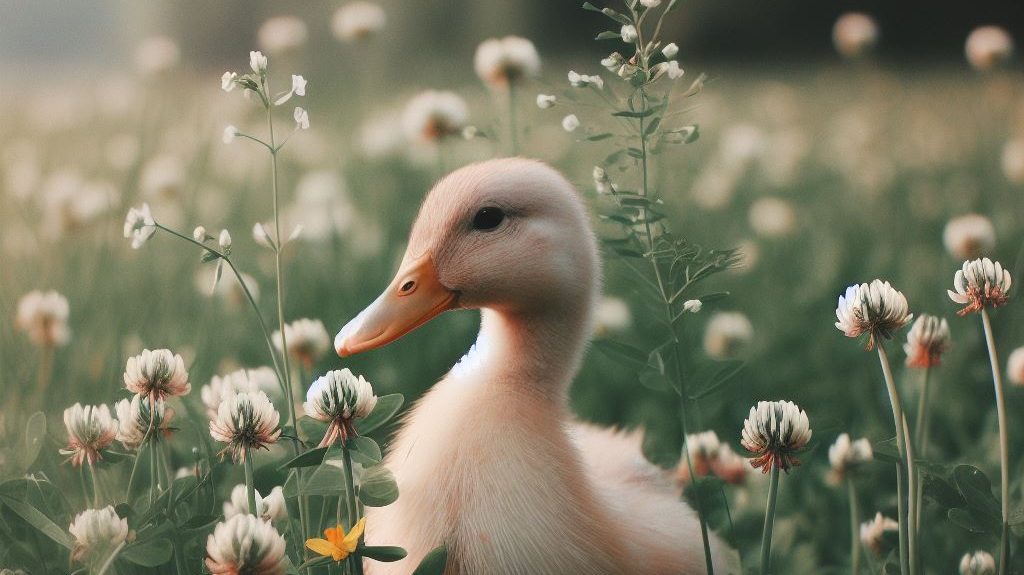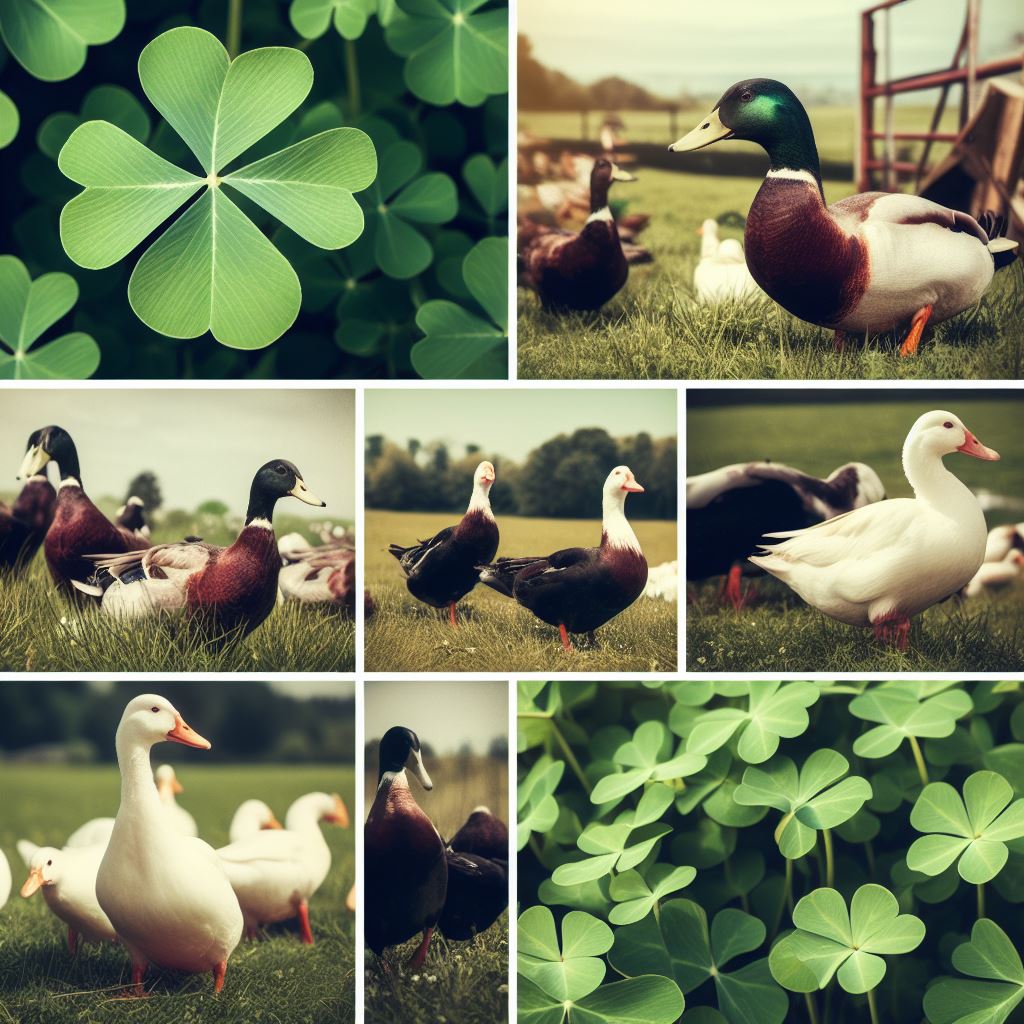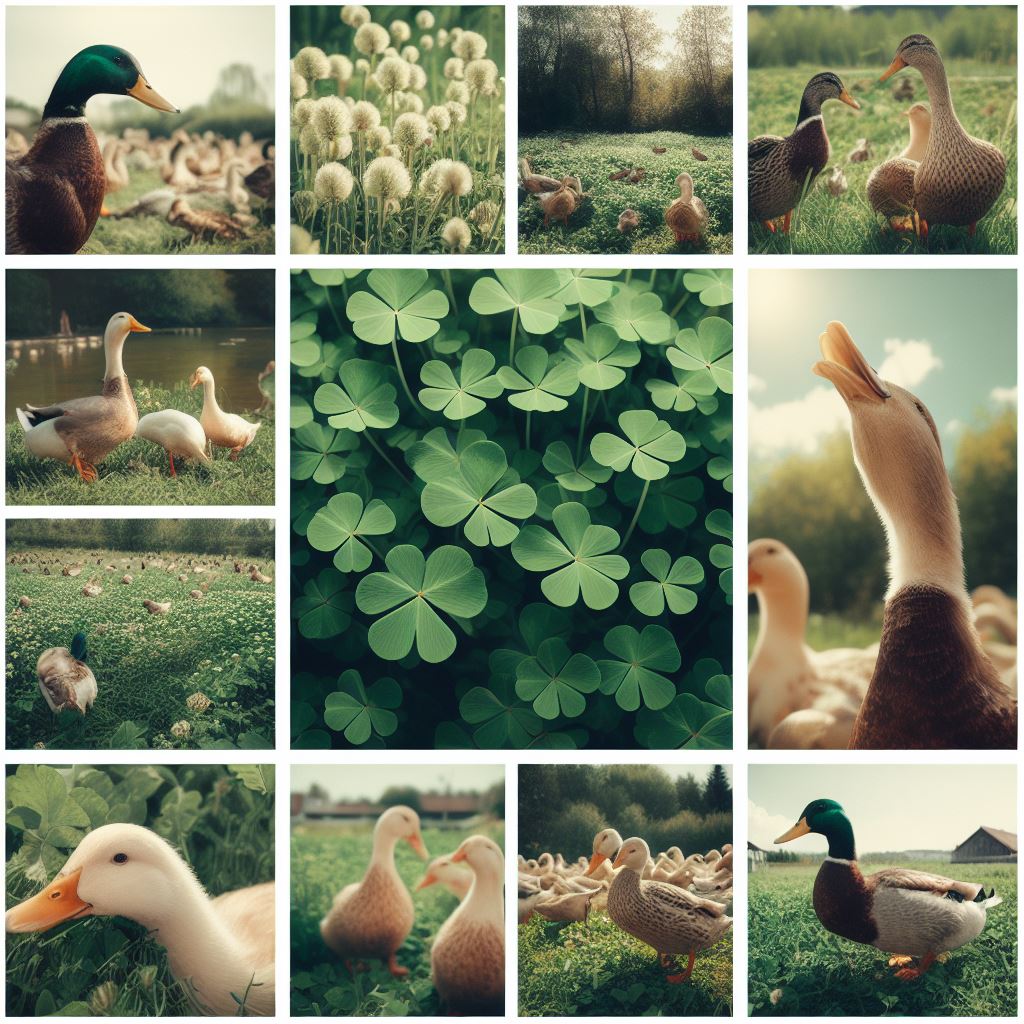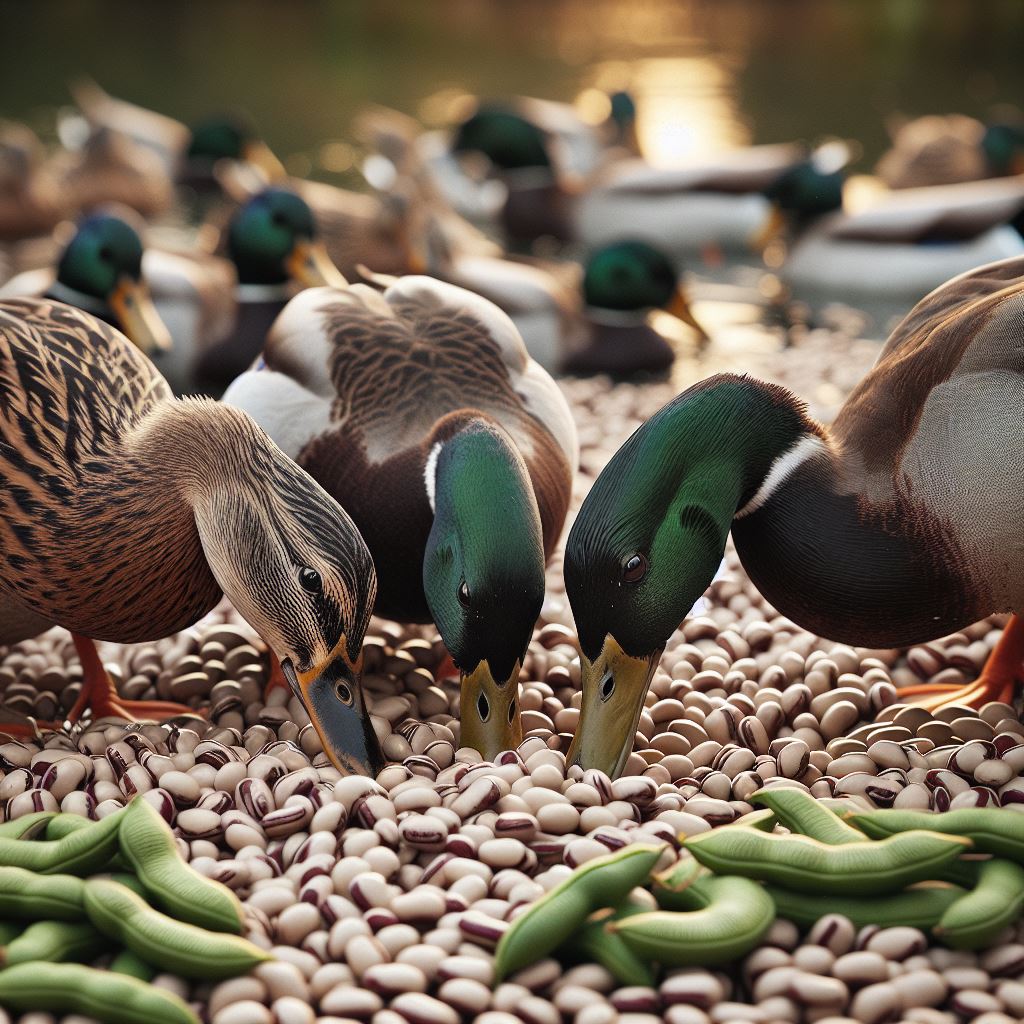Can Ducks Eat Clover? Benefits and Concerns for Duck Owners

Table of content:
Can Ducks Eat Clover? Clover can make a nutritious and safe addition to a duck’s diet when fed in moderation. While ducks will readily eat clover if given access, it should not make up the bulk of their food intake. Here’s what duck owners need to know about feeding clover and clover-related plants.
Key Takeaways:
- Clover provides protein, minerals, and vitamins ducks need, but lacks adequate fiber.
- Feeding clover in moderation is fine, but it should not exceed 25% of a duck’s diet.
- Toxicity risks are low with most clover types, except crimson and red clover which can cause liver issues in large amounts.
- Prioritize grass, aquatic plants, grains, vegetables, and commercial feed over clover.
- Limit clover intake for young ducklings and egg-laying ducks.
 An Overview of Ducks Eating Clover
An Overview of Ducks Eating Clover
Clover plants belong to the legume family and are commonly found in lawns, pastures, roadsides, and meadows worldwide. There are more than 300 species of clover, with white, red, and crimson being the most prevalent.
White clover (Trifolium repens) is the most widespread type. It has characteristic rounded leaves with pale white crescent markings. Red clover (Trifolium pretense) has pinkish-red flowers and is larger and taller than white clover. Crimson clover (Trifolium incarnatum) has crimson red flowers and is commonly grown as a winter cover crop.
Ducks will readily consume most types of clover if allowed to graze areas where clover grows. White clover is the safest variety for ducks to eat. In moderation, it poses very little risk of toxicity and provides nutritional value. Other clover species, like red and crimson should be limited due to higher toxin risks.
To keep ducks healthy, clover should comprise no more than 25% of their diet. A diverse diet focused on species-appropriate foods is ideal. Most of a duck’s nutrition should come from grains, commercial duck feed, dark leafy greens, and aquatic plants.
Nutritional Value of Clover for Ducks
Here are some of the main nutritional benefits clover offers ducks:
- Protein – Clover contains 15-25% protein, providing ducks with amino acids for growth and egg production. The protein levels are similar to alfalfa.
- Vitamins & Minerals – Clover is high in vitamins A, B, C, and K. It also provides significant calcium, phosphorus, iron, potassium, magnesium, and manganese.
- Low Calories – Clover is low in fat and calories compared to grains. This can benefit overweight ducks.
However, clover lacks adequate fiber for ducks. Grass, hay, and aquatic plants are better fiber sources. Insufficient fiber can cause digestive issues in ducks.
Flavonoids – Clover contains flavonoid antioxidants like quercetin and isoflavones that support duck health. However excess intake can cause toxicity.
Overall, clover makes a fine supplemental food for ducks but does not provide complete nutrition on its own. It should be fed alongside fiber, protein, and vitamin sources.
Are Clover and Trefoils Safe for Ducks to Eat?
Most varieties of clover are safe for ducks in moderation. However, some clover types are toxic to ducks when eaten in excess. Here are the risks to watch out for:
- Red clover – Contains phytoestrogens that can impair egg laying and fertility in large amounts. Limit to less than 10% of diet.
- Crimson/Scarlet Clover – Has anticoagulant properties that can cause internal bleeding if comprising over 25% of food intake.
- Oxalis – This trefoil plant found in gardens contains high oxalic acid levels that can bind calcium and cause kidney damage. Keep intake low.
- Shamrocks – Shamrocks belong to the oxalis family, rather than true clovers. Ingesting shamrocks also poses an oxalic acid toxicity risk for ducks.
The ideal diet for ducks contains 75% or more grass, commercial feed, vegetables, and grains. Clover should never exceed 25% of intake. Most clover is safe when kept to less than 10%.
 Tips on Feeding Clover to Ducks
Tips on Feeding Clover to Ducks
Follow these tips for safely incorporating clover into your ducks’ diet:
- Limit clover to 25% or less of total food intake. The lower, the better.
- Prioritize grass, duck feed, produce, insects, and grains over clover.
- Avoid grazing ducks in fields overrun by red or crimson clover.
- Do not feed oxalis, shamrocks, or other oxalic acid-containing plants to ducks.
- Cut back clover feeding for ducklings under 4 weeks old.
- Reduce clover for egg-laying ducks to avoid estrogen interference.
- Provide grit to help ducks grind and digest plant-based foods like clover.
- Ensure plenty of fresh water to prevent toxicity risks.
- Evaluate duck droppings for signs of diarrhea from clover overconsumption.
- Do not make your own clover-heavy duck feed mix without vet approval.
Healthiest Plants & Foods to Feed Ducks
While ducks will eat clover, there are many healthier options to make up the bulk of their diet. Try to source at least 75% of your ducks’ food from the following:
Grass – Grass provides fiber and allows ducks to graze naturally. Fresh grass should be a major part of any duck’s diet.
Duck Feed – A quality complete commercial duck feed provides balanced protein, vitamins and minerals ducks need.
Vegetables – Chopped greens like kale, spinach, lettuce provide nutrition and variety.
Fruits – Chopped berries and melons offer ducklings vitamins. Offer in moderation.
Insects – Ducks thrive when allowed to forage for protein-rich bugs like slugs, worms, beetles and flies.
Grains – Whole oats, rice, barley, and wheat support muscle growth and egg production.
Aquatic Plants – For wild/free-range ducks, algae, seaweed, hydrilla provide healthy fats and amino acids.
A diverse, high-fiber diet based on the above foods is ideal for optimal duck health and happiness. Clover or trefoils can supplement this diet but should not replace or outweigh the foods listed here.
Frequently Asked Questions about Ducks Eating Clover
Can ducks eat white clover?
Yes, white clover is the safest variety for ducks to eat. It provides nutritional benefits and poses little risk of toxicity when fed in moderation. Limit white clover to 25% or less of total food intake.
Is clover poisonous to ducks?
Most clover is not poisonous to ducks when consumed in small amounts. Exceptions are red clover and crimson/scarlet clover. These varieties contain toxins that can cause liver and kidney damage in excess. Keep red and crimson varieties to less than 10% of the diet.
Should ducks have access to clover?
Allowing ducks to graze on areas with clover is fine as long as clover does not make up more than 25% of the total vegetation. Rotate grazing areas to prevent overconsumption of any one plant, including clover. Provide ample higher-fiber options like grass.
Can baby ducks eat clover?
While not toxic, clover lacks the optimal nutrition for ducklings under 4 weeks old. Their diet should focus on commercial starter feed, insects, and chopped greens. Avoid grazing young ducklings in clover-heavy areas so they don’t fill up on it.
Will clover hurt duck eggs?
Eating excessive amounts of red clover could potentially impact egg production and fertility due to its estrogen-like effects. To be safe, limit red clover with laying ducks. Other clover varieties like white are gentler and unlikely to cause issues in moderation.
Conclusion
Most types of clover make a fine supplemental feeding option for ducks when consumed in moderation. White clover is the best choice, with red and crimson clover warranting more caution.
While ducks relish clover, it should never outweigh grass, greens, aquatic plants, and commercial feed in their diet.
Following the tips in this article will allow you to safely integrate some clover into your flock’s menu. A diverse diet focused on species-appropriate foods will keep ducks healthy and happy.
Welcome. I’m Adreena Shanum, the proud owner of this website, and I am incredibly passionate about animals, especially poultry. I founded adreenapets.com as a labor of love, stemming from my desire to share my knowledge and experiences with poultry enthusiasts worldwide.




